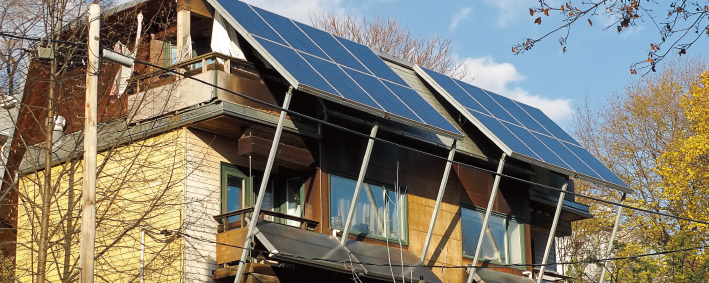 |
CCST9020 Scientific and Technological Literacy
|
Course Description
“First we shape our buildings; thereafter they shape us.” (Winston Churchill)
An ever-growing awareness of the adverse impacts that humans are having upon the natural environment is prompting a greater public awareness of the need to live in a sustainable manner. An opportunity to enact such a manner of living is no greater than the very place we spend a significant portion of our lives: the built environment. The sustainable functioning of large cities, such as Hong Kong, offers an ideal opportunity to positively influence the present and future impact of human activities on our planet.
Students of this course should gain an informed understanding of the central issues associated with sustainable development of the built environment and the ways in which these issues have been responded to throughout history and the present day. The central question is about continued quality development of the built environment into the future. Students will develop their ability to critically reflect on the different strategies, best practices and technologies to tackle issues of the built environment in a systematic manner.
Topics specific to this course include (i) global issues related to the natural and built environment, (ii) the sustainable development framework applied to the built environment and associated technologies, (iii) relevant ethical, socio-economic, philosophical and political issues and the role of different stakeholders, (iv) energy and carbon, and (v) case studies locally and abroad. Students will be expected to attend lectures and tutorials, participate in tutorial discussions, search literature and read widely, and also undertake a field trip (within Hong Kong) and report on their learning experience.
[A half-day field trip will be held off-campus in Hong Kong during Reading Week. Three options of time will normally be provided for the field trip, and students will be required to choose one for participation.]

Course Learning Outcomes
On completing the course, students will be able to:
- Demonstrate understanding of abstract to semi-technical issues relating to sustainable development in the context of the built environment.
- Demonstrate awareness of the impact of human activity on the natural and built environment and argue the role professionals have played and will play.
- Describe modern built environment systems and sustainable technologies.
- Formulate strategies to ensure sustainable development of current and future built environments.
Offer Semester and Day of Teaching
First semester (Wed)
Study Load
| Activities | Number of hours |
| Lectures | 24 |
| Tutorials | 10 |
| Fieldwork / Activity during reading week | 3.5 |
| Reading / Self-study | 48 |
| Assessment: Assignments | 1 |
| Assessment: Individual report on group project | 18 |
| Assessment: Oral presentation (incl preparation) | 18 |
| Assessment: Examination | 2 |
| Total: | 124.5 |
Assessment: 60% coursework; 40% examination
| Assessment Tasks | Weighting |
| Assignments | 10 |
| Participation in tutorial discussions | 15 |
| Written report | 10 |
| Presentation | 25 |
| Examination | 40 |
Required Reading
Journal Articles:
- Dong, Y. H., Jaillon, L., Chu, P., & Poon, C. S. (2015). Comparing carbon emissions of precast and cast-in-situ construction methods–A case study of high-rise private building. Construction and Building Materials, 99, 39-53. From https://doi.org/10.1016/j.conbuildmat.2015.08.145
- Govindan, K., Shankar, K. M., & Kannan, D. (2016). Sustainable material selection for construction industry–A hybrid multi criteria decision making approach. Renewable and Sustainable Energy Reviews, 55, 1274-1288. From https://doi.org/10.1016/j.rser.2015.07.100
- Luo, L., Jin, X., Shen, G. Q., Wang, Y., Liang, X., Li, X., & Li, C. Z. (2020). Supply chain management for prefabricated building projects in Hong Kong. Journal of management in engineering, 36(2), 05020001. From https://doi.org/10.1061/(ASCE)ME.1943-5479.0000739
- Pan, W., & Pan, M. (2018). A dialectical system framework of zero carbon emission building policy for high-rise high-density cities: Perspectives from Hong Kong. Journal of Cleaner Production, 205, 1-13. From https://doi.org/10.1016/j.jclepro.2018.09.025
- Pan, W., & Zhang, Z. (2023). Benchmarking the Sustainability of Concrete and Steel Modular Construction for Buildings in Urban Development. Sustainable Cities and Society, 104400. From https://doi.org/10.1016/j.scs.2023.104400
- Pan, W., Li, K., & Teng, Y. (2018). Rethinking system boundaries of the life cycle carbon emissions of buildings. Renewable and Sustainable Energy Reviews, 90, 379-390. From https://doi.org/10.1016/j.rser.2018.03.057
- Yan, H., Shen, Q., Fan, L. C., Wang, Y., & Zhang, L. (2010). Greenhouse gas emissions in building construction: A case study of One Peking in Hong Kong. Building and Environment, 45(4), 949-955. From https://doi.org/10.1016/j.buildenv.2009.09.014
Additional required readings may be also provided in class by the teachers.
Course Co-ordinator and Teacher(s)
| Course Co-ordinator | Contact |
| Professor K. Shih Department of Civil Engineering, Faculty of Engineering |
Tel: 2859 1973 Email: kshih@hku.hk |
| Teacher(s) | Contact |
| Professor K. Shih Department of Civil Engineering, Faculty of Engineering |
Tel: 2859 1973 Email: kshih@hku.hk |
| Dr Zhiqian Zhang Department of Civil Engineering, Faculty of Engineering |
Email: zzq007@connect.hku.hk |
| Professor C.K. Mak Department of Civil Engineering, Faculty of Engineering |
Email: ckmak@hku.hk |

